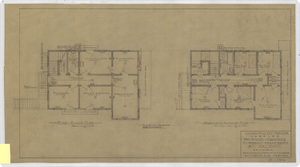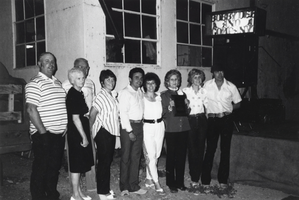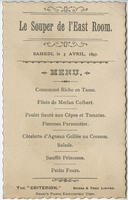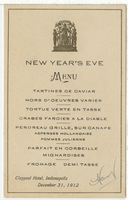Search the Special Collections and Archives Portal
Search Results

Proposed changes to present Los Angeles & Salt Lake Railroad frame depot, Caliente, Nevada: architectural drawing
Date
Archival Collection
Description
From Union Pacific Railroad Collection (MS-00397). The drawing shows the First and Second Floor Plans. The bottom corner says, "Union Pacific System L.A. & S.L.R.R. Proposed Changes To Present Frame Depot At Caliente, Nevada. Asst. Chief Engineer's Office, Los Angeles. Scale 1/4" = 1'0." E.C.B. Oct 30 1922. S118-A."
Image

Family at a gathering in recognition of Rene Zaval's 25 years of service at Carver's Station: photographic print
Date
Archival Collection
Description
From the Nye County, Nevada Photograph Collection (PH-00221) -- Series V. Smoky Valley, Nevada and Round Mountain, Nevada -- Subseries V.C. Lofthouse-Berg Families (Round Mountain). Left to right: Gary Carver, Jean Carver Duhme; behind Jean Carver Duhme is her husband R.M. Duhme, Bertie Carver, Roger Berg, Ann Berg, Irene “Rene” Rogers Berg Zaval, Bobby Berg, Kenny Berg, at a gathering in recognition of Rene Zaval’s 25 years of service at Carver’s Station.
Image

Architectural drawing of the New Frontier Hotel and Casino (Las Vegas), building section thru Post Time Lounge, March 24, 1967
Date
Archival Collection
Description
Sections and reflected ceiling plans for the Post Time Lounge at the New Frontier Hotel and Casino from 1967. Includes revision dates. Original medium: pencil on parchment. Socoloske, Zelner and Associates, structural engineers; Ira Tepper and Associates, mechanical engineers; J. L. Cusick and Associates, electrical engineers.
Site Name: Frontier
Address: 3120 Las Vegas Boulevard South
Image

men000016s001_The Criterion, menu
Date
Archival Collection
Description
Text

Claypool Hotel, New Year's Eve dinner menu, 1912
Date
Archival Collection
Description
Text
Esther Langston oral history interview
Identifier
Abstract
Oral history interview with Esther Langston conducted by Claytee D. White on February 22, 2005 for the UNLV @ 50 Oral History Project. In this interview, Langston provides an overview of her early life and career in social work. She describes how the women in her family are positive and empowering role models. Langston moves on to explain how she become a social worker over a period of many years. She states that a job experience that helped her gain the qualifications of a social worker was working as an office manager at the Nevada Test Site. She also mentions how she has had to work with conflicts such as racial inequalities.
Archival Collection
University of Nevada, Las Vegas Office of Media Relations Records
Identifier
Abstract
The University of Nevada, Las Vegas (UNLV) Office of Media Relations Records (1969-2003) primarily contain copies of UNLV faculty, staff, and alumni newsletters including
Archival Collection
Jinetta Daniels oral history interview
Identifier
Abstract
Oral history interview with Jinetta Daniels conducted by Rani Dunn on November 30, 2014 for the African Americans in Las Vegas: a Collaborative Oral History Project. In this interview, Daniels talks about her upbringing in Mississippi and traveling to Las Vegas, Nevada by bus in 1962. She continues discussing her work as a maid at the Dunes Hotel, her membership in the Victory Baptist Church, and comments on various church and community leaders in the Westside. She also mentions her concerns about the closure of F Street in 2008 and her hopes for the revitalization of the Westside community.
Archival Collection
Robert Worts Photographs
Identifier
Abstract
The Robert Worts Photographs depict the Corn Creek Ranch in Nevada from 1936 to 1939. Located northwest of Las Vegas, Nevada, Corn Creek Ranch was home to writer George F. Worts in the late 1930s. Materials in the collection include photographs of Worts, buildings on Corn Creek Ranch, and a camp on Mount Charleston.
Archival Collection
Edyth Hess Hoban oral history interviews
Identifier
Abstract
Oral history interviews with Edyth Hess Hoban conducted by Jane E. Olive on March 11, 2000 and May 23, 2000 for the UNLV University Libraries Oral History Collection. In this interview, Hoban discusses her early life in Scotland, South Dakota. She remembers the 1918 Influenza pandemic, her early interest in music, and becoming the band leader for the all-women orchestra, The Sophisticates. Hoban talks about moving to Las Vegas, Nevada in 1942, competing and winning in golf tournaments, and changes in Las Vegas golf courses.
Archival Collection
